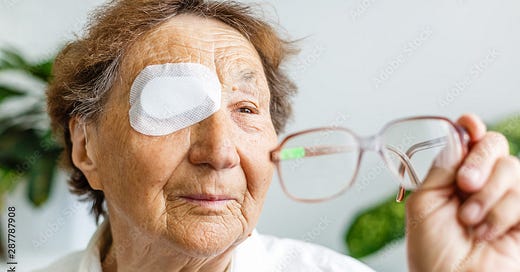Disclaimer: I am not a doctor or medical professional. I am a Google Doc who writes about medicine and knows just enough to annoy the medical profession.
Why isn’t anyone driving at night anymore? Why am I forced to meet friends for lunch when I want to meet for dinner?
It’s because they’re all blind as bats and refuse to get their cataracts removed.
The medical profession is promoting this collective delusion by allowing patients to believe that cataracts have to be “ripe” to be removed.
Waiting to remove cataracts until they’re ripe is an outdated and dangerous myth on par with—oh--Lasik surgery is harmless. Not! Lasik is very risky—it should be outlawed. Everyone I know who had it is now suffering long term side effects that permanently affect their vision.
Unlike Lasik, cataract surgery is safe and effective if done by a good surgeon. In fact it’s a miracle. I wore the proverbial coke bottle glasses before I had it. Throwing them away was incredibly liberating.
Where did this myth of “ripe” cataracts come from?
In the early days of cataract surgery the removal technique involved physically carving the cataract off the eye. To do this without harming the eye it was helpful if the cataract was hard, i.e. “ripe,” when removed, or the surgeon would risk taking off pieces of the eyeball. Over time cataracts “ripen” as the eye gets blinder.
Today that procedure is akin to using leeches instead of surgery. Eye surgeons today use sound waves to break up the cataract and suck it out through a small incision. Or they may use a laser or other small instrument. The surgery is painless with local anesthesia, the incision is small and the stitches dissolve on their own. In fact, the “riper” or harder the cataract is, the more difficult it is to remove, so waiting for it to harden is actually detrimental to successful surgery.
Nonethless, ophthalmologists still tell patients to wait until their cataracts are “ready.” Patients assume they’re waiting for the cataract to ripen. What they’re really waiting for is Medicare to pay. Medicare is reluctant to cover the surgery until the cataracts are substantially impairing your quality of life, hoping, of course, that you will die before they have to pay.
How does Medicare know if your cataract is impairing your quality of life? You say so. You tell your doctor it is. Approval for surgery is totally depending on patient reporting. In the meantime, you can forgo driving at night—and seeing properly. They don’t really care if I have no one to go to dinner with.
So why do so many of us keep putting this miracle procedure off? Fear of course. But it’s not a facelift. It’s not really even elective surgery. If you have a cataract it’s going to have to be removed sooner or later, so why not sooner? Why not spend the rest of your life being able to see really well instead of with diminished vision? Even better, why not spend a couple thousand extra on those new multi-focal lenses that allow you both close and distant vision. I wish those had been available when I got cataract surgery.
You are wusses my friends. Tell your doc you can’t see at night and your cataracts are impairing your life. Welcome to the world of colors and freedom from glasses or contacts.
Hearing aids will never give you normal hearing. Knee replacements will never give you back your flexible knees. Dentures certainly won’t give you back normal teeth. But cataract surgery is different. It’s one of the few procedures that actually gives you back your youth in one crucial area of life. There are not too many painless, quick, relatively risk-free surgeries you can say that about at our age.
After you recover let’s go out to dinner at 7. You can pick me up.





I have been putting off cataract surgery out of nothing buy fear. You are so right and now I am ready to see the light (groan) once again. Thank you for removing my fear while making me laugh. That's talent my friend!
I'm totally on board with this. Cataract surgery is one of the great medical triumphs of the 20th century. I got monovision, which means that one eye is corrected for distance and the other for closeup. The brain seamlessly merges the 2, which means I don't need to whip out glasses to read restaurant menus. I do have glasses because my computer falls in the middle zone between the 2 corrections and to see a little better at a distance, eg for going to the theater (when is that going to happen again) and for driving (ditto).